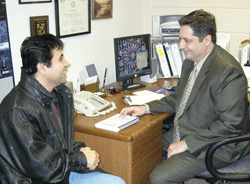By Joline Carraway/reporter

School has started for the spring semester, and the pressure is on.
Students hustle to turn in assignments on time, get good grades, participate in extracurricular school activities and still find personal time for themselves and their friends.
Such pressures, however, can become overwhelming.
“School can take up a lot of your time, especially for those students going full time,” Rochelle Morris, a continuing student, said.
Studies show that for every hour students spend in class, they should spend two hours outside of class studying. So for a student enrolled in 12-15 credit hours, this college commitment can range from 36 to 45 hours per week. That is equal to the amount of time an individual spends on a full-time job.
So where can students possibly find enough time, and what about students who work and have families, businesses and careers in progress?
As TCC students completed finals last semester, they offered advice to others starting or continuing their education.
“ Don’t get too relaxed, and don’t look at everything with rose-colored glasses,” Morris said. “Evaluate your classes because all classes are not for everyone. Also don’t expect all of your teachers to be your friends because they are there to teach you.”
Morris and other students who work full time, go to school and have families have more advice for newcomers.
“ One of the most important aspects of learning is just coming to class,” she said. “They [new students] don’t realize the importance of information they could be missing while absent.”
Most of the students agreed that study time is another important factor when it comes to success in school. Establishing a regular study area and time so it is easier to focus is helpful. Some subjects are harder than others, so studying difficult subjects first can help eliminate procrastination.
Jenice Cash is another working student with advice.
“ Show up and turn in assignments, take your tests and stick in there,” she said. “Do not procrastinate because time management can be hard for new students.”
Cash said students should stay focused and prepare for negativity.
“ Believe in the process and be patient,” she said.
Time wasters—watching television, talking on the telephone, surfing the net, hanging out with friends and napping—are a big problem for students. Cash said students should have a plan and follow it.
“ Know your academic goals and state them,” she said. “Prioritize tasks, write a daily to-do list and focus on routines.”
Because a positive environment is imperative to success, Cash suggested keeping ego-boosters around and hanging out with people who have similar goals.
“ Physical health is as important as mental health, so eat right,” she said. “Combining leisure and health-related activities is also a good time saver.”
Frances Ramos, a first-year college student, completed the Women In New Roles program on South Campus.
“ If you take college seriously, it will help you with a clear path to success,” she said.
Her first semester in college, Ramos entered the WIN-R program, a unique college experience of core curriculum courses designed to assist women in the transition of returning to school.
Studies include areas of self-awareness, leadership development, communication skills and interpersonal relations for confidence building.
The WIN-R program gives assistance in career testing, counseling, placement and exposure to available career opportunities and college majors through blended curriculum and applied courses.
Ramos, who successfully completed the course, will further her studies in English communication at TCC. She plans to transfer to the University of Texas at Arlington and complete her B.A. and M.A. degrees in teaching through a blended-curriculum course. Ramos wants to start as a teacher and work her way to school guidance counselor.
“ What I have learned in this course [WIN-R] has built a foundation for me about education,” she said.
Maria Moron successfully completed her last semester at TCC this fall.
“ College can get frustrating at times,” she said. “To participate in class not only builds relationships that can last forever, but when taken seriously, it can lead down the road to self-discovery.”
Moron believes college offers more than book learning.
“ College teaches diversity and helps build confidence and self-esteem,” she said.
TCC also considers students who have busy schedules and cannot attend classes on campus by offering distant learning classes through Internet and television delivery, following its mission to provide affordable and open access to quality teaching and learning.

























